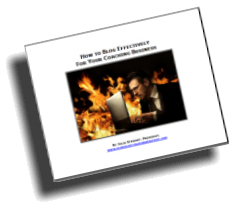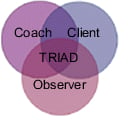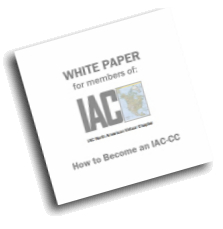 In sports, it's called thinking like a winner vs. thinking like a loser.
In sports, it's called thinking like a winner vs. thinking like a loser.
In Law of Attraction terms, it's thinking that attracts what you want vs. thinking that repels what you want. I call it success thinking vs. failure thinking. Regardless, these thoughts are powerful and they can hijack your client's plans no matter how well you coach them.
Most, if not all, failure thinking comes from the Voice of the Victim, in Big Mind terms. We all have it to some degree. Ironically, the victim can jump out just when your client is about to succeed! Genpo Roshi, who pioneered the Big Mind process, says that the victim story is a cover up for disowning the voice of 'seeking power'. Read on and you'll see why.
What does failure thinking sound like? Helpless. Focused on obstacles more than goals. The client has placed power outside of him/herself and put it in their circumstances. Think: whining.
A few strategies for coaching your client to success:
1. Most of the time, your client's inner victim just needs to be heard. Usually we try to shut down our victim thoughts, but if we never voice them, they may block us from doing what we really want. Procrastination and self-sabotage are examples. Encourage your client to voice their complaints - up to a point. Five minutes of 'BMW Time' (bitch, moan & whine) at the start of the coaching session can work wonders.
Example: I had a client who hired me to help her work on her personal development just before her husband left her for another woman. She was seeing a therapist, but her husband's cruel antics threatened to dominate our coaching sessions until we established BMW Time at the start of each session and devoted the rest to her personal growth.
2.Validate how your client feels - again up to a point. Most clients just need to know that they're okay, even though they're scared. Definitely support them in that, but take care not to get caught up in the client's story. Validate the client, not their belief that they are going to fail.
3. Sometimes the client needs to upgrade his/her community. If you're client is surrounded by failure thinking, it may feel normal to them. Limiting time with the Negative Nancies and expanding time spent with folks who think positively can work wonders. Help your client develop awareness around this, so they can make empowering choices.
4. If failure thinking persists, you may have to bring out the sledgehammer. Sometimes your client just needs you to call them on their crap. Remember, it's your job to tell the truth, but if you sense your client it too fragile to hear it, you may need to skip straight to #5.
Example: When I was working on my MFA in Dance, I was fortunate enough to study choreography with Phyllis Lamhut, a dance legend who I consider my 1st coach. Working with Phyllis isn't for the faint hearted, but she is brilliant and she tells the unvarnished truth, which is what high achievers really want. One weekend after I performed less than my best in a concert, Phyllis shared the unvarnished truth with me in front of my entire class. Although I was sick and had several other excuses, Phyllis knew I was letting myself down. She told me I was throwing away my career, if I let all of that get in the way. Was I crushed? Slightly. Did I get the message? You bet. Ultimately, there are no excuses; you either do what you really want or you don't.
5. If all of the above doesn't move your client out of failure thinking, they may need therapy more than coaching. If the victim has grown this powerful, you're likely hearing the voice of depression or worse. In this case, the victim has taken over; it's not just seeking power, it has enslaved it. Coaches aren't qualified to diagnose mental illness, but we are qualified to notice when our tools aren't adequate for our client's situation.
What's the difference between knowing our limits and thinking like a failure? The outcome. Failure thinking leads to failure. Recognizing limits leads to growth and new possibilities. Learn the difference and help your clients succeed.












 One of the many hurdles that a new coach might struggle with is getting up that first website.
One of the many hurdles that a new coach might struggle with is getting up that first website.



